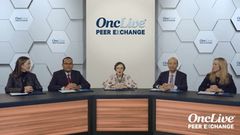
Emerging Agents for Relapsed-Refractory HER2+ MBC
Episodes in this series

Transcript:
Joyce A. O’Shaughnessy, MD: The new ADCs [antibody-drug conjugates] that are coming out against HER2 gendered a lot of excitement. Sara, tell us about the trastuzumab deruxtecan.
Sara A. Hurvitz, MD: Yes, we’ve heard some incredibly promising phase I data regarding this molecule, which I know best as DS-8201a. But we now have a name for it. It is essentially a HER2 [human epidermal growth factor receptor 2]—targeted antibody. It is exactly like trastuzumab but the same idea, linked to DXd [exatecan derivative], which is along the lines of a topo [topoisomerase] I inhibitor and sort of like irinotecan. But again, it is proprietary to the molecule. This molecule, interestingly, is loaded with a lot more of the chemotherapies per antibody. Unlike T-DM1 [trastuzumab emtansine], which absolutely requires the HER2 receptor to be overexpressed for the chemotherapy to get inside the cell, this really can actually have activity in stage I-plus, II-plus, and III-plus HER2-expressing breast cancers in the metastatic setting.
They demonstrated in very heavily pretreated patients in the phase I setting. I think the median prior number of lines of therapy in their phase I study was around 6 or 7, and their objective response rate was north of 50%. It was pretty close to that for HER2 stage I-plus/II-plus as well.
It doesn’t require that you have to get in. There’s this so-called bystander effect, which I think is a fancy way of saying the chemotherapy is released in the cell, and then it can seep out the cell and kill nearby neighboring cells that may not be so HER2+. There are intriguing concepts that perhaps it’s stimulating an immune response because of the cell death in this area. It’s a very interesting molecule. Bottom line, the activity with the phase I study with the level of pretreatment in these patients is something I’ve never seen before.
There’s 1 safety signal we’re all looking closely at right now, and that is interstitial lung disease. They’ve had a handful of fatal cases that were initially in Japan. This company started in Japan, so a lot of its early patients were Japanese, and differing toxicities have been seen with respect to pneumonitis. I think there’s going to have to be a lot of careful attention to properly selecting patients for use of this molecule. But there was a press release that their phase II single-arm study met its primary endpoint, so hopefully we’ll be seeing data. I was involved in that study, and I have to say I’m incredibly excited with this molecule. I hope that we see the same sort of exciting results that we’ve seen in the phase I study.
Joyce A. O’Shaughnessy, MD: Excellent. That’s very exciting. I think we’re in tune these days with early finds of interstitial pneumonitis with cough and shortness of breath. If you’re alert to it early on, I think it’s a matter of consciousness. And then you can stop the medication and give some steroids.
Erika P. Hamilton, MD: That may be 1 of the reasons some of those early cases were fatal, because it wasn’t recognized the drug was going to have that adverse effect. Perhaps patients weren’t treated as briskly as we would now. We haven’t seen as many pneumonitis cases of recent patients, so hopefully that’s a good thing.
Debu Tripathy, MD: We’re really looking forward, so there are 2 randomized trials going on. One is for HER2+ but also a HER2-, comparing it with chemotherapy of resistance choice with trastuzumab and HER2.
Joyce A. O’Shaughnessy, MD: We won’t be giving chemotherapy anymore; we’ll be giving just chemotherapy hooked up to antibodies. That’ll be great, huh? That’ll be super. What is pirotinib? Here comes a new molecule with good data behind it.
Erika P. Hamilton, MD: Right, another TKI. This was a study out of China. Pirotinib is a nonspecific HER2 TKI, and has impressive results. PFS [progression-free survival] increased from 4.1 to 11 months, and capecitabine plus or minus pirotinib. I have to say, though, my 1 issue with this study is that I would have liked to see the control arm not be capecitabine alone. I would have liked to have some HER2 blockade in that control arm, whether it was trastuzumab or whether it was lapatinib. I’m just left with this little bit of unsettled feeling of, “Well, how much benefit is with pirotinib over having HER2 blockade in that arm?”
Joyce A. O’Shaughnessy, MD: Yeah, very interesting. I think it’s not totally specific for HER2, but I think it’s in the selective neighborhood for HER2. It’s got some other anti-HER2, but I think that it distinguishes a little bit from the lapatinibs and neratinibs of the world.
Erika P. Hamilton, MD: But it’s also not a tucatinib, which is HER2 only.
Joyce A. O’Shaughnessy, MD: Right. Tucatinib is the other very exciting TKI. So there’s lots going on in the HER2+ space. I was really heartened by a lot of the talks, because in the adjuvant curative setting we really are chipping away at the patients who recur. It’s really exciting.
Erika P. Hamilton, MD: I think we need new HER2 agents because our agents that we typically thought of as metastatic—pertuzumab, T-DM1—are being pulled up, right? For a lot of those patients, they’re going to have already seen it, and we need new agents in the metastatic setting.
Debu Tripathy, MD: But we’re seeing fewer metastatic patients because we’re controlling them more in the early stage. That’s great. But still, I think as we develop these and move them earlier, it will even give us a better shot at completely eradicating recurrence. Wouldn’t that be a great thing?
Joyce A. O’Shaughnessy, MD: Unbelievable.
Transcript Edited for Clarity





































